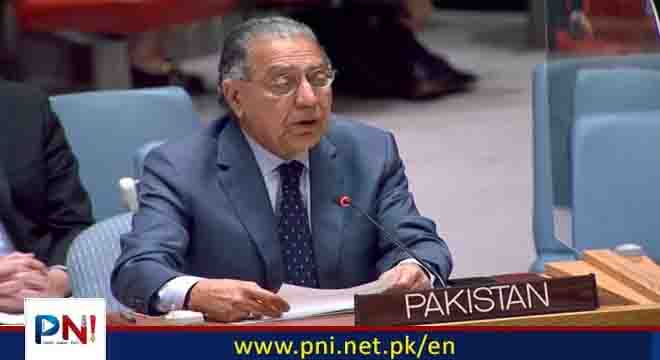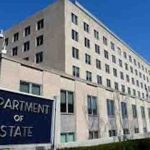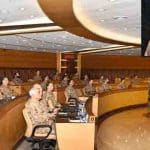NEW YORK, Aug 06 : Highlighting the similarities of the situations in occupied Palestine and Indian-occupied Kashmir, Pakistan’s UN Ambassador Munir Akram told a Kashmir solidarity meeting on Monday that both violate two basic international law principles — the right of self-determination and non-acquisition of territory by force.
Speaking on the occasion, he said that the main conclusions of the International Court of Justice (ICJ) on Palestine apply not only to the Israeli-occupied Occupied Palestinian Territory but have become part of international law and also apply to Indian occupied Jammu and Kashmir
“The UN also has an obligation ‘not to recognize’ the illegal situation and to ‘consider further action’ to put an end to the illegal presence of the occupying power,” Ambassador Akram told the meeting, which marked the fifth anniversary of India’s annexation of Jammu and Kashmir.
“Pakistan will seek the application of these conclusions of the ICJ in the case of Palestine as well as in the case of occupied Jammu and Kashmir,” he said at the gathering jointly organized by the Permanent Mission of Pakistan to the UN and the Consulate General of Pakistan in New York.
A large number of people including Permanent Representative of Turkiye, Ambassador Ahmet Yıldız, diplomats belonging to the OIC Contact Group on Kashmir, members of Kashmiri diaspora community, and youth and students attended the event.
Apart from Ambassador Akram, among those who addressed tthe event were Dr Ghulam Nabi Fai, Secretary General of World Kashmir Awareness Forum, Abdelhamid Siyam, senior Palestinian journalist and professor, Ambassador Hameed Ajibaiye Opeloyeru, Permanent Observer of the OIC Mission to the UN, Senator Lt. General (rtd ) Abdul Qayyum, former chairman of the Senate Standing Committee on Defence Production.
At the outset, Consul General Aamer Ahmed Atozai welcomed the distinguished speakers and guests for making time to express unflinching solidarity with the oppressed people in Indian Occupied Kashmir.
He emphasized the significance of the “Youm-e-Istehsal” and the continued struggle of the Kashmiri people for their right to self-determination.
Consul General Atozai said the Indian government’s actions, aimed at demographic changes in Jammu and Kashmir, were a clear attempt to alter the region’s Muslim-majority character. Issuing over 4.2 million domicile certificates to non-Kashmiris, seizing land, and allowing non-Kashmiris to buy property and register to vote, are all part of a settler-colonial project that is a violation of international law.
“This project aims to disempower and disenfranchise the Kashmiri people, and it constitutes a war crime under international law.”
At Monday’s meeting, speakers including diplomats, human rights activists, academics and journalists linked the establishment of durable peace and security to the resolution of the longstanding political disputes and the grant of right of self-determination to peoples under foreign occupation, especially those in occupied Kashmir and Palestine.
While also drawing attention to the striking similarities between the Kashmiri and Palestinian freedom struggles, the speakers termed the right to self-determination as the pivot of the UN Charter and an essential condition without which sustainable peace and stability were not possible.
In his remarks, Ambassador Akram focused on the flagrant violation of international law, the UN Charter, and Security Council resolutions in India’s occupation of Jammu and Kashmir.
Elaborating the key points of the ICJ advisory opinion, Ambassador Akram said that foreign occupation violates the UN Charter’s principles of self-determination and non-acquisition of territory by force. He said imposing national laws and establishing permanent control by the occupying power in occupied Kashmir violates international conventions.
He said the UN General Assembly or Security Council should decide the modality for self-determination. For Jammu and Kashmir, the Security Council has prescribed a UN-sponsored plebiscite. He said demographic and legal changes by the occupying power violate the principle of non-acquisition of territory by force and specific UN resolutions on Jammu and Kashmir.
The Pakistani envoy said that prolonged occupation aggravates the denial of self-determination and necessitates urgent resolution. He said that in line with the opinion of the ICJ, other states must cooperate to end the occupation, not recognize changes imposed by India, and ensure compliance by the Indian occupying power.
He also said that a letter from Pakistan’s Deputy Prime Minister and Foreign Minister, Ishaq Dar, has been delivered to the President of the Security Council, the President of the General Assembly, and the UN Secretary-General, outlining six key conclusions:
— India’s illegal occupation has resulted in severe human rights violations against the Kashmiri people;
— India’s demographic and legal changes in Jammu and Kashmir violate UN resolutions and the Fourth Geneva Convention, amounting to “war crimes”;
— Despite repression, India cannot suppress the Kashmiri quest for freedom and self-determination;
— The Kashmir dispute poses a clear threat to international peace and security;
— India’s military build-up could provoke a regional arms race and aggression; a “strategic restraint regime” should be accepted; and,
— The international community cannot ignore the serious threat to South Asian peace and security.
Pakistan, he said, will “robustly and proactively” highlight the Jammu and Kashmir dispute as non-permanent member of the UN Security next year in an effort to seek a resolution based on the UN Charter, UN
resolutions, and the will of the Kashmiri people.
Ambassador Hameed Ajibaiye Opeloyeru, Permanent Observer of the OIC Mission to the UN, said that the OIC has consistently called on the international community to expedite action on the implementation of the UN resolutions, while also leaning on India to respect and support the fundamental and basic human rights of the people of Jammu and Kashmir.
“This includes the need to refrain from altering the demographic structure and realities of the disputed territory,” he said.
Ambassador Hameed also referred to the various OIC resolutions in which the 57-member body called for the reversal of the unilateral actions of the Indian authorities on August 5, 2019.
He also reiterated the OIC’s call for all the member states of the UN to encourage the implementation of the relevant UNSC resolutions on peaceful settlement of the territorial dispute in the Indian-occupied Jammu and Kashmir in accordance with the wishes of Kashmiris.
Dr Ghulam Nabi Fai, Secretary General of World Kashmir Awareness Forum, described Ambassador Munir Akram as a staunch advocate of Kashmiris’ struggle for self-determination, and said there were similarities between colonial-settler policies pursued by India in Kashmir and Israel in Palestine. Narendra Modi and Benjamin Netanyahu, he said, were acting upon identical policies.
Fai said that through the illegal and immoral actions of August 5, 2019, Modi sought to deprive Kashmiris of their distinct religious, cultural and political identity, and underscored the need for consistent efforts to expose India’s violations of the UN Charter and international law in Kashmir.
Dr Abdelhamid Siaym, senior Palestinian journalist and professor, also drew parallels between Indian-occupied Kashmir and Palestine. He shared different suggestions to effectively highlight the plight of Kashmiris globally at the hands of Indian occupation authorities. He advocated for a greater OIC role in exposing the denial of the fundamental right of self-determination to Kashmiris by mobilizing international opinion, forming collaborations with different human rights organizations and reaching out to the policy-makers in the world capitals.
Senator Lt. General (rtd) Abdul Qayyum said that the United Nations had failed to amicably resolve conflicts that involve the question of self-determination. He said that without re-energizing the UN Charter, the vision of a peaceful world will remain a pipedream.
He said that young leaders such as Burhan Wani represent a new reality of Jammu and Kashmir which is animated by an aspiration for freedom from the Indian yoke.
Follow the PNI Facebook page for the latest news and updates.









